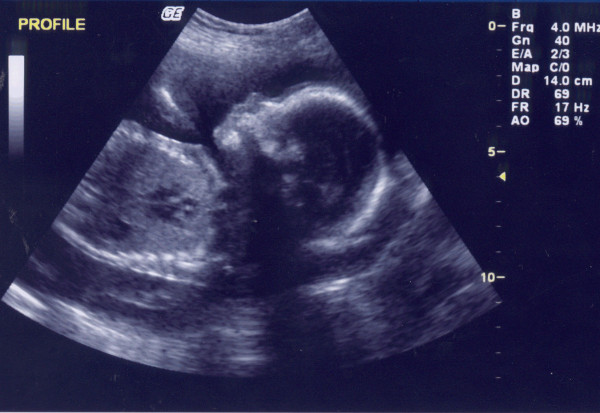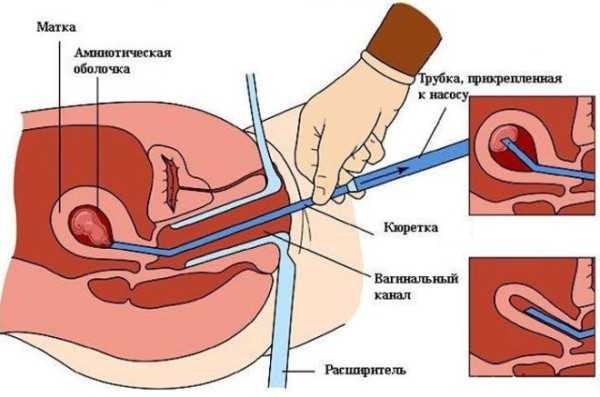Why does a frozen pregnancy happen and can it be prevented
A frozen pregnancy qualifies as one of the types of miscarriage and is characterized by the termination of pregnancy before the due date. Most often this occurs in the first and second trimester of pregnancy, less often in the third. A frozen pregnancy can happen in one of 2 scenarios - the fetus in the uterus either does not develop and cannot be seen on an ultrasound scan, or the embryo for some reason dies during pregnancy. In order to prevent miscarriage in the future, it is necessary to carefully study the causes of this phenomenon, as well as find out how safe it is to plan the baby after cleaning.
Content
Causes of a frozen pregnancy
Unfortunately, doctors cannot always determine the cause of the death of the embryo, but there are a number of factors that affect the normal course of pregnancy:
- About 80% of miscarriages are directly related to genetics. Most often, fading occurs at 7-8 weeks and is caused by disorders in which normal development and subsequent birth is simply impossible. The genetic factor can belong to both the father and the mother, often this manifests itself in complex incompatibility.
- Hormonal disruption is one of the five most common causes of freezing. Failure can be of a different nature, usually it is associated with a deficiency of progesterone in the body of the expectant mother or an excess of the male hormone, androgen. In any case, this problem is easily diagnosed even at the planning stage.
- At risk are those couples who use IVF for the sake of having a baby in their family, there is a high probability of termination of pregnancy for up to 10 weeks.
- A number of STIs untreated in time, for example, syphilis or chlamydia, certainly play their negative role.
- During gestation, a woman's body is especially susceptible to attack by infections and viruses, some of which are dangerous for the fetus. The death of the embryo is affected not only by rubella or cytomegalovirus, but even a banal acute respiratory disease.
- There is a lot of talk about a healthy lifestyle, which a woman is simply obliged to lead during the period of bearing a baby. Too tight clothes, stress and overstrain, bad habits - all this must be abandoned even before conception.
How long is a frozen pregnancy
Since most of the causes affecting embryo fading can be identified even at the planning stage, experts recommend that women who are at risk are examined in advance and eliminate ailments. It is important to foresee everything so that trouble does not touch a happy married couple.
According to statistics, most of the problems with miscarriage occur in the first half pregnancy, namely in the first trimester. However, development can stop at any time, even several weeks before delivery.
Doctors call the time frame when the fetus is especially vulnerable to negative factors, the critical periods are from 3-4 weeks, 8-11 weeks and 16-18 weeks. At 8 weeks, the unborn baby is actively developing vital organs, so there is a high probability of fading. 
Signs of a frozen pregnancy
Embryo death or a stop in its development in the early stages may not be noticed. The most obvious factor signaling a frozen pregnancy in the first trimester is the absence of probable signs of pregnancy, namely:
- all signs of toxicosis disappear - nausea and vomiting in the morning, drowsiness, rejection of certain odors, but there is an acute or pulling pain in the lower abdomen and in the lower back;
- for up to 10 weeks, the breast ceases to hurt, the woman does not notice engorgement of the mammary glands;
- closely monitor the basal temperature, a decrease to 37 degrees signals a threat or freeze of the embryo;
- the level of hCG decreases, therefore, a pregnancy test will show a negative result or two weak strips;
- act immediately if you notice dark spotting.
In late pregnancy, it is quite difficult to miss the moment of fading, because fetal movements are already obvious and noticeable. If they are absent, but you feel pain in the lower abdomen, immediately consult a doctor, because if the dead fetus is not removed in time, severe intoxication will begin, accompanied by fever, weakness and malaise.
The basis for diagnosing a frozen pregnancy is ultrasound. The study, as a rule, does not reveal the presence of palpitations and movements, the embryo may not correspond to the size in terms of time, in case of anembryonia, the specialist will see only an empty fertilized egg.

Cleaning after a frozen pregnancy
As soon as a woman is diagnosed with a frozen pregnancy, doctors immediately begin cleaning the uterus in order to remove the embryo and prevent subsequent intoxication and the development of inflammatory processes. The length of pregnancy directly affects which method of medical cleaning the doctor chooses.
- The safest and least traumatic method is cleaning with special medications, but it is suitable for patients whose period does not exceed 5 weeks.
- Another gentle method in early pregnancy (up to 8 weeks) is the use of vacuum aspiration under local or general anesthesia. It consists in sucking the contents of the uterus using a special device, while the tissues are minimally damaged, the discharge lasts from one to three days.
- Medical scraping is considered a dangerous procedure and is performed almost blindly under general anesthesia. The specialist produces it with a surgical instrument - a curette, then treats the vagina with an antiseptic solution and puts ice on the stomach for the fastest contraction of the uterus. Curettage is considered a surgical intervention; any doctor's mistake or sudden complications can lead to problems with subsequent gestation. In the first 2-3 weeks, the patient may have lower abdominal pain and spotting.
- After 20 weeks of pregnancy, labor is induced artificially with the help of medications.
The recovery period after curettage can range from several weeks to several months. Despite the fact that, in the absence of complications, a woman is discharged home in the first days after cleaning, you need to take rehabilitation seriously and follow all the instructions of a specialist, including taking antibiotics and medications that block pain.
Weakness in the early days is the norm, you should stay in bed, avoid stress and do not burden yourself with physical work that can cause bleeding. Give up sex until the cause of the embryo freezing is clarified or use contraceptives, pregnancy can come very quickly, and this would be undesirable.
Do not hesitate and go to the hospital if:
- you got up heat;
- bleeding has begun or increased;
- critical days last more than two weeks;
- pain relievers do not block discomfort in the lower abdomen;
- the discharge has acquired an unpleasant odor, from which it follows that an infection has begun.
Pregnancy after a frozen pregnancy
Theoretically, the next pregnancy after the fetus freezes is possible almost immediately after scraping, the eggs are ready for maturation, but this does not mean that the woman's body is ready for gestation, because the uterus and endometrium should recover after surgery, and the hormonal background and general condition of the expectant mother will return to normal ...
The main stage on the way to a new pregnancy should be the study of the causes of miscarriage, diagnosis and treatment. Gynecologists recommend starting planning no earlier than six months or a year later, and the longer the gestation period, the more it influenced the woman's body and psyche. If the couple does not listen to the advice and conception occurs again, the risk of identifying fetal pathologies due to weakened immunity increases, anemia, lack of vitamins, etc.





